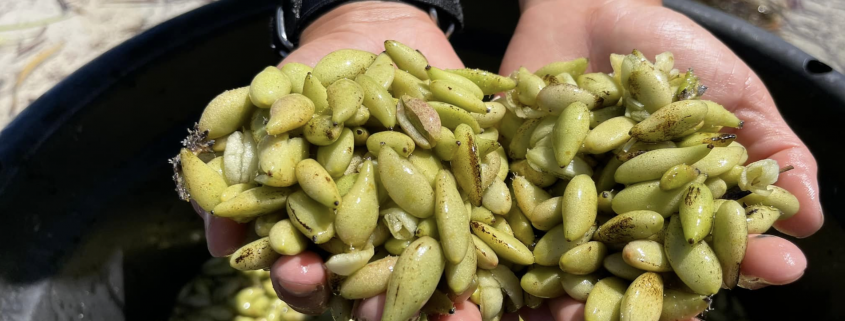Seeds for Snapper – community spearhead citizen science
An annual program led by leading UWA and WAMSI scientists to address the loss of seagrass in Cockburn Sound, is calling on volunteers to participate in local marine science to help restore the meadows.
Community-based initiative ‘Seeds for Snapper,’ is a collaboration between The University of Western Australia and fishing conservation charity OzFish. United by a common aim to restore extensive loss of seagrass meadows in Cockburn Sound, the partnership has established a long-standing community volunteer base with a passion for seagrass restoration.
Seagrass meadows are an important part of Cockburn Sound’s ecosystem, which also act as a nursery for baby pink snapper, calamari, whiting and blue swimmer crabs.
In October, Seeds for Snapper will scale-up its operations with funding support under the WAMSI Westport Marine Science Program to inform seagrass restoration potential for Western Australia’s future terminal [Link to WAMSI website].
The collection and processing of seagrass fruit for their seeds to restore shallow areas in Cockburn Sound was originally a UWA-based initiative. This involved a small team of experienced researchers and students, led by project co-ordinator Professor Gary Kendrick and Research Officer Rachel Austin from UWA’s School of Biological Sciences.
Following a partnership with OzFish in 2020, a growing community volunteer base was established, with the project expanding to seven days a week during the fruit collection season. A mixture of skilled and beginner divers and onshore volunteers were recruited for the collection of fruit, as well as the onshore preparation, cleaning and counting of fruit and seeds.
“The enthusiasm and passion in our volunteers was incredible and their dedication and commitment. Some volunteers did 15 to 20 dives each, even on their days off. We have big plans for next season.” Rachel Austin, UWA
The project has facilitated a means for volunteers to participate in marine science, particularly for those with a passion for the ocean and seeking to make a difference but lack the qualifications.
Professor Kendrick said “many volunteers want to get involved in research but were unsure how or lacked the appropriate qualifications. Seeds for Snapper has provided them with a unique opportunity.”
In coming years, the team hopes to further equip volunteers with the skills to monitor fruit maturity and density and improve understanding about which sites to target and when.
Last season, more than 1.1 million seagrass fruit were successfully collected over 316 dives by 100 individual divers in Cockburn Sound and Owen Anchorage. This year, the team hope to disperse over one million seeds.
Research Officer Rachel Austin said the plan is to expand and scale up the seeds for snapper project into other areas of seagrass restoration. “Our aim is to be able to restore seagrass on ecologically relevant scales” she said.
To volunteer for the Seeds for Snapper Program visit the OzFish website.

